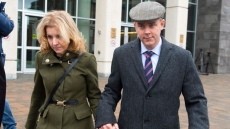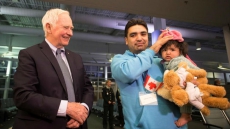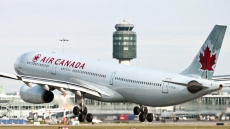OTTAWA — Federal Finance Minister Bill Morneau is expecting to hear from his provincial counterparts Monday about a familiar, contentious subject: equalization payments.
Morneau, who will meet with regional ministers for a second day in Ottawa, released figures Sunday outlining how much the neediest provinces can expect to receive from the federal government in the next fiscal year.
The constitutionally guaranteed equalization program will redistribute nearly $18 billion in 2016-17 to poorer provinces, where the cash will help fund public services.
Under the formula, the same six so-called have-not provinces that received cash in 2015-16 — Quebec, Ontario, Manitoba, Nova Scotia, New Brunswick and Prince Edward Island — will get the payments again next year.
That means provincial economies hit hard by low commodity prices — such as Alberta and Saskatchewan — will continue to pay into the program.
On Sunday, Morneau appeared to want to steer clear of the sometimes thorny issue.
"Equalization I'm sure will come up," Morneau said when asked if he thought the equalization formula is fair when struggling, resource-reliant provinces like Alberta and Saskatchewan were still considered among the well-to-do.
"I expect that at every meeting of the finance ministers that is a subject that people will discuss."
Quebec Finance Minister Carlos Leitao, whose province receives by far the most from the program, said Sunday that the equalization formula will eventually reflect the low energy prices.
Leitao, a former bank economist, said the "very complex" calculation has yet to factor in the weak energy prices because it's based on a three-year moving average of nominal gross domestic product.
When asked about the formula's fairness, Leitao said federal coffers take in cash from all provinces — including about 23 per cent that comes from Quebec.
"So, a portion of it gets transferred back (to Quebec) and more," he said as he arrived for a dinner meeting with the ministers.

In 2016-17, Quebec will receive about $10 billion from the nearly $18-billion program.
Historically, provinces have had their differences about equalization.
Saskatchewan Premier Brad Wall has expressed frustration with the formula, arguing it doesn't easily take into account the changes in resource prices, such as oil and hydro, making it years behind the times.
Wall has also said provinces like Manitoba and Quebec receive bigger payments because the formula doesn't account for the revenues they rake in from hydro power. The calculation does, however, factor in non-renewable resource revenue from oil and gas.
He has called for the payments to be halved to allow Ottawa to instead invest the money in things like infrastructure projects across the country.
On Sunday, British Columbia Finance Minister Michael de Jong said he expected the ministers to raise the issue of equalization with Morneau as part of the broader talks about all federal transfers, including health payments.
Asked if the current formula was fair, de Jong answered by saying he was happy his province is considered among those that don't qualify for the payment.
"Candidly, I don't want to be a province that is categorized as have-not," de Jong said.
"At the same time, the distribution has to take place on an equitable basis."
Ontario Finance Minister Charles Sousa said his province has always given $11 billion more, year-over-year, than it has received — even when it has qualified for equalization.
The province will receive $2.3 billion next year from the program.
"So, still, Ontario is a net contributor to the federation and we'll continue to be so and we recognize how important that is for us to have a strong federation," Sousa said.
He added that other provinces that have qualified for equalization have had "substantively more" per-capita support than Ontario.
"But that's OK," Sousa said.
"We want to support all provinces to be at their best and we will work together to do so."


